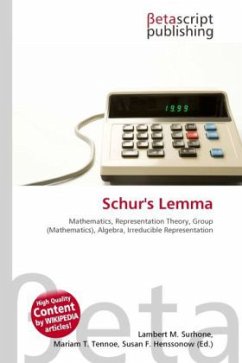
Schur's Inequality
Versandkostenfrei!
Versandfertig in 6-10 Tagen
26,99 €
inkl. MwSt.

PAYBACK Punkte
13 °P sammeln!
High Quality Content by WIKIPEDIA articles! In mathematics, Schur's inequality, named after Issai Schur, establishes that for all non-negative real numbers x, y, z and a positive number t, x^t (x-y)(x-z) + y^t (y-z)(y-x) + z^t (z-x)(z-y) ge 0 with equality if and only if x = y = z or two of them are equal and the other is zero. When t is an even positive integer, the inequality holds for all real numbers x, y and z. Since the inequality is symmetric in x,y,z we may assume without loss of generality that x geq y geq z. Then the inequality (x-y)[x^t(x-z)-y^t(y-z)]+z^t(x-z)(y-z) geq 0, clearly ho...
High Quality Content by WIKIPEDIA articles! In mathematics, Schur's inequality, named after Issai Schur, establishes that for all non-negative real numbers x, y, z and a positive number t, x^t (x-y)(x-z) + y^t (y-z)(y-x) + z^t (z-x)(z-y) ge 0 with equality if and only if x = y = z or two of them are equal and the other is zero. When t is an even positive integer, the inequality holds for all real numbers x, y and z. Since the inequality is symmetric in x,y,z we may assume without loss of generality that x geq y geq z. Then the inequality (x-y)[x^t(x-z)-y^t(y-z)]+z^t(x-z)(y-z) geq 0, clearly holds (to be sure), since every term on the left-hand side of the equation is non-negative. This rearranges to Schur's inequality.












